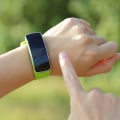A fitness tracker allows you to monitor and record your heart rate, daily calories burned, and step count. Automatic tracking allows you to eat a healthier diet, exercise more and sleep better. Regular use of the fitness tracker increases your daily workouts and makes them achievable. In theory, there are endless benefits to using fitness trackers.
Previously, fitness trackers were mainly used to record simple things like steps and calories burned. Today, they can do much more, such as controlling temperature, heart attacks, and more. According to a recent survey, approximately one in five people has a smartwatch or fitness tracker. These wristband monitors are a practical way to record your daily steps and are probably more accurate than the record on your smartphone, which you might not have with you every moment you're awake.
Most portable devices also offer a variety of other data, such as heart rate, walking pace, and more. In addition, commercial fitness trackers may not be suitable for sports you regularly play, such as water sports, diving, or car racing. Knowing this, it's best to take the time to evaluate yourself, your fitness goals, your lifestyle, and your needs before investing in a fitness tracking device. For example, if you wear a fitness watch when you box, it's not recommended because it can affect the wrist support of the glove.
For example, if your physical activity goal includes greater mobility, a fitness monitor won't be able to add any significant data. While fitness trackers have many advantages, they don't necessarily fit your needs or where you are on your fitness journey. While this is ideal for most people who can enjoy the benefits of tracking physical activity at an affordable price, it also means that fitness trackers aren't made for people with special conditions.








